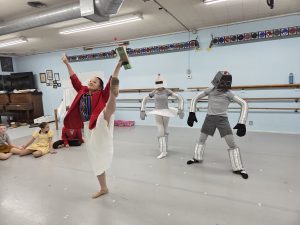From an early age, conductor Elena Sharkova knew that music would be her path in life.
Growing up in the former Soviet Union, where music was a significant part of early childhood education, Sharkova showed such a sensitivity to music that her teachers advised her parents that she shouldn’t listen to music in minor musical keys.
“I was, literally, released from singing songs in minor until I was six,” Sharkova said.
Since then, Sharkova has embraced all musical keys, and this Friday will conduct Symphony San José chorale and orchestra in “Serenade to Music” at Mission Santa Clara, honoring the 100th anniversary of the death of composer Giacomo Puccini (1858-1924) and featuring the composer’s Messe di Gloria.
Her clear talent earned Sharkova a spot in a professional music education program at no cost to her parents other than buying a piano. At 15, Sharkova went on to conservatory, graduating with a degree in piano and music education, and a subsequent Master’s in conducting from the Petersburg State Rimski-Korsakov Conservatory.
Almost immediately, Sharkova hit the glass ceiling that faced female conductors.
“Every time I would apply for a job in Russia, the answer was always the same: Why do you need to be a conductor?” she said. “You’re such a pretty girl.
“A woman would not be offered, or would not receive, a job where she conducts men,” Sharkova continued. “You [women] conduct women’s choirs and you conduct children’s choirs. You do not teach at a higher learning institution. It’s incredible that you receive this phenomenal degree and then right off the bat you cannot have opportunities that men have.”
Instead of conducting, Sharkova went on to chair the choral department of the Rimski-Korsakov Conservatory and sang with a professional choir, where she recorded with major record labels and had the opportunity to travel overseas.
The collapse of the Soviet Union in 1991 opened the door for Sharkova to crack the glass ceiling for women conductors.
“I already visited many countries [and] saw in Europe for instance, women still did not have opportunities, “ she explained. But the United States was “one country where it was not as bad as everywhere else. You saw a lot of teachers, a lot of professors at universities who were women.”
Sharkova was accepted to a graduate program at Western Michigan University, “and that’s why I’m here,” she said. Currently the Artistic Director of Symphony San Jose Chorale and the Cantabile Youth Singers of Silicon Valley, Sharkova has earned an international reputation as a conductor and teacher, and is noted for her interest in non-Western, cross-genre, and multi-cultural music.
Friday’s program opens with Melody by Ukrainian composer Myroslav Skoryk, a piece that has become associated with the Ukrainian fight against Putin’s invasion. It puts Sharkova in the thick of current events.
“As a musician, my reaction for everything is: how can I how can I take what I know best, which is to form and interpret music, and elevate people who are oppressed,” she explained.
With relatives on both sides of the Russia-Ukraine border, Sharkova can’t escape the tragedy of the war.
“We grew up singing Ukrainian folk songs. Ukrainian dances are one of the first dances I learned as a little child,” she said.
Sharkova reports that her expertise in Russian music has become as casualty of the war, as she’s no longer invited to conduct Russian music.
The centerpiece of Friday’s concert is Puccini’s Messa di Gloria. Puccini is best known for his popular operas like La Boheme and Madama Butterfly. But his first major composition was also his only sacred composition. Written as a graduation exercise in 1880, the work wasn’t performed again until 1952. Although Puccini was only 18 when he wrote it, the work displays all of the energy and melody that characterize Puccini’s more famous operas.
“Things are changing in the very beginning of his [Puccini’s] life,” said Sharkova.
Members of the Puccini family served as Maestro di Cappella in Lucca, Italy for five generations and Giacomo was expected to succeed his father.
“But he was so interested in opera,” explained Sharkova, “and he wrote this [music] to say: I’m going to give this to the church. I’m going to proclaim my faith in the Catholic religion with this piece of music, and I will never come back to that.
“This is just a tremendous piece of music, and you will be humming the tunes,” added Sharkova.
The beautiful Mission Santa Clara Church is a fitting venue for major sacred works, and Sharkova says it’s her favorite venue on the peninsula.
“It has the most incredible ambiance,” she said. “It truly enhances everything good you have in your voice, in your instrument, in your in the harmonies. Just everything there makes [the sound] flourish. I really hope that everybody will take advantage of the opportunity to hear great music there.”
Serenade to Music on Friday, April 12, at 7:30 p.m. at the Santa Clara Mission Church, 500 El Camino Real, on the campus of Santa Clara University. Tickets are $25-$45. To buy tickets to the Symphony San Jose concert or for more information, visit www.symphonysanjose.org or call (408) 286-2600.
Related Posts:
Mission Santa Clara Features Konstantin Shvedov’s Liturgy
Santa Clara Chorale Celebrates 60th Anniversary
Mission Era Music Rings At Mission Church












0 comments